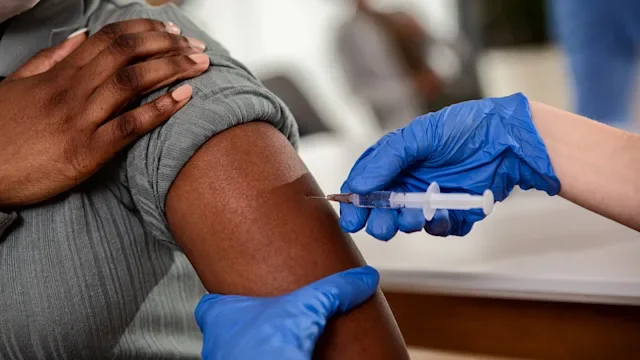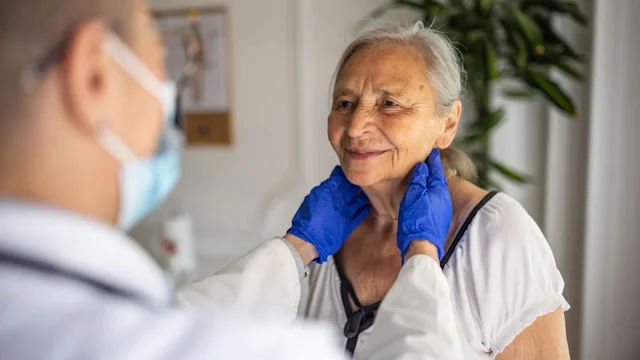Key takeaways:
Getting vaccinated is the best way to protect yourself from serious illness as the fall and winter months approach. Experts recommend that eligible people should receive the COVID-19, the flu, and respiratory syncytial virus (RSV) vaccines during this time.
An updated COVID vaccine is recommended for everyone ages 6 months and older who is able to receive one. For younger children, the number of doses and timing may depend on their age and vaccination status.
The CDC recommends an RSV vaccine dose for people ages 75 and older. People ages 60 to 74 who are at higher risk of severe RSV are also eligible. The CDC also recommends Abrysvo for pregnant women during weeks 32 and 36 of pregnancy. As of right now, you don’t need an RSV vaccine dose this year if you’ve received one in the past.
The flu vaccine is recommended for everyone ages 6 months and older who is able to receive it. Your flu vaccine options can depend on your age and health status.
As the leaves change color and the air gets cooler, it’s time to think about getting your annual flu vaccine. But you may want to add a couple more vaccines to your list, as experts are expecting a “tripledemic” — a surge in COVID-19, flu, and respiratory syncytial virus (RSV) cases — this year.
You may have questions about vaccine eligibility, timing, and cost. And to make your life easier, you may want to know if you can schedule your vaccines together. We cover the answers to those questions and more below.
Which vaccines does the CDC recommend for the fall?
The Advisory Committee on Immunization Practices (ACIP) is a group of experts that advises the CDC on vaccine recommendations. They weigh in on the vaccine schedules for children and adults, as well as vaccine specifics such as eligibility, timing, and more.
Given an anticipated surge of respiratory illnesses heading into fall, ACIP and the CDC are recommending the COVID, flu, and RSV vaccines for those who are eligible.

RSV vaccines
For many people, RSV often feels like a mild cold. But for some, including older adults and babies, RSV can be dangerous. Fortunately, RSV vaccines are now available for certain groups of people.
There are currently three RSV vaccines available: Abrysvo, Arexvy, and mRESVIA. All three vaccines can lower the risk of serious respiratory illness from RSV. There’s also an RSV immunization called Beyfortus (nirsevimab) that’s recommended for babies and certain young children. But this is not technically considered a vaccine.
For most people, the best time to get an RSV vaccine is usually sometime between August and October, which is shortly before RSV starts. However, it’s not currently recommended to get an RSV vaccine every year. So if you’ve received an RSV vaccine dose in the past, you don’t need to get another one this year.
Who should get an RSV vaccine
The RSV vaccines are only recommended for specific groups of people:
Older adults: The CDC recommends a single RSV vaccine dose for adults age 75 and older. Adults ages 60 to 74 who have an increased risk of severe RSV are also eligible for an RSV vaccine dose. You can choose between Abrysvo, Arexvy, and mRESVIA.
During pregnancy: If you’re pregnant, you may be eligible to receive Abrysvo to help protect your newborn from RSV. This is because your antibodies (infection-fighting proteins) from the vaccine can pass to the fetus during pregnancy, providing protection for 6 months after birth. The CDC recommends a dose if you’re between 32 and 36 weeks of pregnancy during September through January.
How they compare: Three COVID vaccines are available in the U.S. But is one better than the other for your seasonal shot?
Flu vaccine options: Learn more about the flu vaccines available for the 2024-2025 flu season, including which options may be better for certain people.
RSV vaccines: Learn more about the current state of RSV vaccines, including what’s available and what’s being studied.
RSV vaccine side effects and risks
Temporary, mild side effects are possible after receiving an RSV vaccine dose. Examples of RSV vaccine side effects include:
Pain, swelling, and redness at the injection site
Fatigue
Muscle pain
Joint pain
Headache
Rare but serious side effects have also been reported with the RSV vaccines, including allergic reactions. Abnormal heart rhythms, Guillain-Barré syndrome, and facial paralysis have also occurred in a few people. But it’s not clear if the vaccines were the cause.
Read more like this
Explore these related articles, suggested for readers like you.
RSV vaccine cost
All ACIP-recommended vaccines for adults, including RSV vaccines, are free for people with Medicare Part D. This is also the case for many Medicaid enrollees.
However, if you have private health insurance or don’t have Medicare Part D, you may have a copay. How much you pay can depend on your plan. So it’s a good idea to check your specific coverage ahead of time. Otherwise, the list price for an RSV vaccine dose is typically around $300. GoodRx can also help you save on Abrysvo, Arexvy, or mRESVIA RSV vaccine.
COVID vaccines
There are currently three COVID vaccines available in the U.S.: Pfizer (Comirnaty), Moderna (Spikevax), and Novavax. The Pfizer and Moderna vaccines use messenger RNA (mRNA) technology. The Novavax vaccine is a protein subunit vaccine, which is the same type as the hepatitis B vaccine.
Similar to the annual flu vaccine, the COVID vaccines are updated every year to target circulating viral variants. The 2024-2025 formulations of the Pfizer and Moderna COVID vaccines target a strain called KP.2. The Novavax COVID vaccine targets a strain called JN.1.
Who should get a COVID vaccine
The CDC recommends that everyone ages 6 months and older receive an updated COVID vaccine, if they’re eligible. Additional vaccine eligibility information by age and vaccination status is detailed below.
Children ages 6 months to 4 years old:
Vaccination status | Authorized use |
|---|---|
Never received a COVID vaccine | Three doses of updated Pfizer vaccine series OR two doses of updated Moderna vaccine series |
Received one Pfizer vaccine dose at least 3 weeks ago | Two updated Pfizer vaccine doses, 8 weeks apart |
Received two or more Pfizer vaccine doses at least 8 weeks ago | One updated Pfizer vaccine dose |
Received one Moderna vaccine dose at least 1 month ago | One updated Moderna vaccine dose |
Received two or more Moderna vaccine doses at least 2 months ago | One updated Moderna vaccine dose |
People ages 5 and older:
Vaccination status | Authorized or approved use |
|---|---|
Never received a COVID vaccine | Single dose of an updated Pfizer or Moderna vaccine OR Two doses of the updated Novavax vaccine, given 3 weeks apart (ages 12 and older only) |
Received a COVID vaccine at least 2 months ago | Single dose of an updated Pfizer or Moderna vaccine OR Single dose of the updated Novavax vaccine (ages 12 and older only) |
People with weakened immune systems may be eligible for additional vaccine doses. Discuss your eligibility and vaccine recommendations for your healthcare team.
COVID vaccine side effects and risks
Many people experience mild, temporary side effects after receiving a COVID vaccine. These can include the following side effects, which usually go away after a day or two:
Fever
Fatigue
Injection site reactions such as pain and swelling
Muscle pain
Headache
While rare, more serious side effects have been reported. These include severe allergic reactions, Guillain-Barré syndrome, and myocarditis or pericarditis.
COVID vaccine cost
Even though the public health emergency has ended, the COVID vaccines are still free for many people. Most private health insurance plans, as well as Medicare, cover the vaccines at no cost. This is also the case for many adults with Medicaid. And certain children are eligible for free COVID vaccines through the Vaccines for Children program.
If you’re uninsured, you may be able to get COVID vaccines for free at your state or local health department. GoodRx can also help you save on your Pfizer, Moderna, or Novavax vaccine at certain pharmacies with free discounts.
Good to know: The COVID vaccine itself may be free, but you may be charged an administration fee. This can depend on where you get the vaccine.
Quiz: Can I get a COVID-19 vaccine?
Flu vaccines
Getting your annual flu vaccine is one of the best ways to protect yourself from serious illness from the flu.
Who should get a flu vaccine
The flu vaccine is recommended for everyone ages 6 months and older. There are many flu vaccine options available. Which ones you can receive depend on your age, health history, and preferences. Your primary care provider or pharmacist can help select one that’s right for you.
| Vaccine type | Examples | Eligibility |
|---|---|---|
| Standard-dose shot |
|
Ages 6 months and older |
| Nasal spray | Ages 2 to 49 years old | |
| Recombinant shot* |
|
Ages 18 and older |
| High-dose shot |
|
Ages 65 and older |
| Adjuvanted shot** |
|
Ages 65 and older |
| *Most flu vaccines contain a dead or weakened flu virus. The recombinant vaccine contains lab-made flu virus proteins instead of the virus itself. **Adjuvants are substances added to vaccines that help boost your immune response. |
||
Here are a few flu vaccine considerations for certain groups of people:
Older adults: The high-dose, recombinant, and adjuvanted flu shots are preferred for older adults. That’s because they’re made to generate a stronger immune response. This is important because your immune system doesn’t respond to vaccines as well as you get older.
Weakened immune systems: People with weakened immune systems should avoid the nasal spray flu vaccine. This is because it contains a live, weakened version of the flu virus that could cause an infection if your immune system isn’t very strong. Pregnant women should also avoid the nasal spray flu vaccine due to a theoretical infection risk to the fetus.
Egg allergies: Some flu vaccines are made using eggs. Even if you have an egg allergy, you can likely still receive any of the flu vaccines. But if you’re concerned about an allergic reaction, the Flucelvax and Flublok vaccines are egg-free options.
Flu vaccine side effects and risks
The side effects you may experience after getting the flu vaccine can depend on which one you receive. But in general, common flu vaccine side effects include:
Fever
Headache
Muscle aches
If you receive the flu shot, you may also experience pain, swelling, and redness at the injection site. If you receive the nasal spray vaccine, you may also experience a runny or stuffy nose and a sore throat.
Flu vaccine cost
Most insurance plans cover the flu vaccine at no charge. But you may be charged an administration fee, depending on where you go. If you’re uninsured, there are a few options for getting your flu vaccine for free or at a lower cost, such as local health centers. GoodRx can also help you save on your flu vaccine at the pharmacy.
Can you get the COVID, flu, and RSV vaccines together?
Yes. Generally speaking, you can get the COVID, flu, and RSV vaccines together. But there’s limited data on getting all three vaccines at the same time.
You can also decide to receive the vaccines at different times, or receive any combination of vaccines at the same time. For example, you may choose to get your COVID and flu shots during the same appointment. Evidence has shown that this combination is safe.
The ability to receive vaccine doses at the same time can also depend on your eligibility. If you just had COVID, you have the option of waiting at least 3 months before receiving the current vaccine. In this case, you may not want to delay other vaccines in the meantime.
When should you schedule your COVID, flu, and RSV vaccines?
The purpose of getting vaccinated in the fall is to protect you while the infection risk is highest. For certain vaccines, it’s also best to time your dose so it lasts through the entire season. But even if you miss the recommended window, it’s not too late to receive a dose.
Flu vaccine: Timing matters with the flu vaccine. The CDC recommends that most people should get the flu vaccine in September or October, since protection can wane over the course of the flu season. But some people, including pregnant women in their third trimester and certain children, can receive it in July or August.
RSV vaccine: For older adults, it’s best to get an RSV vaccine in late summer to early fall, shortly before RSV season starts. If you’re between 32 and 36 weeks pregnant, talk to your healthcare team about your options and timing. Keep in mind that the RSV vaccine isn’t an annual vaccine. You don’t need another dose if you got one last year.
COVID vaccine: COVID vaccine timing can depend on several factors. If you’ve never received a COVID vaccine before, you don’t need to wait to receive a dose. If it has been less than 2 months since you’ve received a COVID vaccine, you may not qualify for a dose yet. Timing for younger children can depend on their age and specific vaccination history. And if you’ve recently recovered from COVID, you can wait 3 months to receive a dose.
Where to get vaccinated
One of the most convenient ways to get a COVID, flu, or RSV vaccine is by going to your local pharmacy. Some stores may accept walk-ins, but it’s usually a good idea to make an appointment. Other locations include local vaccine clinics, healthcare systems, and urgent care centers. You may also have the option to administer the FluMist flu vaccine yourself at home.
If you’re looking for a specific COVID vaccine, you may have the option to select which vaccine you get while making an appointment online. For the Novavax COVID vaccine, you can search the vaccine finder on the manufacturer’s website. It’s also a good idea to double-check with the pharmacy to make sure the vaccine is in stock.
The bottom line
The COVID-19, flu, and respiratory syncytial virus (RSV) vaccines are recommended for those who are eligible.
The annual flu and updated COVID vaccines are recommended for everyone age 6 months and older. The RSV vaccine is recommended for people age 75 and older. People age 60 to 74 who are at higher risk of severe RSV and certain pregnant women may also be eligible. But if you’ve previously received an RSV vaccine dose, you don’t need to receive one this year.
If you’re unsure which vaccines you should receive and when to schedule a dose, talk to your primary care provider or pharmacist.

Why trust our experts?


References
Centers for Disease Control and Prevention. (2023). Flu vaccine safety.
Centers for Disease Control and Prevention. (2023). What to know about getting flu, COVID-19, and RSV vaccines at the same time.
Centers for Disease Control and Prevention. (2024). Current CDC vaccine price list.
Centers for Disease Control and Prevention. (2024). Flu and children.
Centers for Disease Control and Prevention. (2024). How to pay for vaccines.
Centers for Disease Control and Prevention. (2024). RSV vaccine guidance for pregnant people.
Centers for Disease Control and Prevention. (2024). Seasonal flu vaccine basics.
Centers for Disease Control and Prevention. (2024). Staying up to date with COVID-19 vaccines.
Centers for Disease Control and Prevention. (2024). Vaccines for moderately to severely immunocompromised people.
Centers for Disease Control and Prevention. (2024). Vaccines for older adults.
Centers for Disease Control and Prevention. (2024). Variant proportions.
Medicaid.gov. (n.d.). Quality of care vaccines.
Sayed, B. A., et al. (2023). Inflation reduction act research series: Medicare part D enrollee savings from elimination of vaccine cost-sharing. Assistant Secretary for Planning and Evaluation.
U.S. Department of Health and Human Services. (2021). How to pay.
U.S. Food and Drug Administration. (2023). FDA approves first vaccine for pregnant individuals to prevent RSV in infants.
U.S. Food and Drug Administration. (2024). FDA approves and authorizes updated mRNA COVID-19 vaccines to better protect against currently circulating variants.
U.S. Food and Drug Administration. (2024). FDA authorizes updated Novavax COVID-19 vaccine to better protect against currently circulating variants.
U.S. Food and Drug Administration. (2024). Moderna COVID-19 vaccine.
U.S. Food and Drug Administration. (2024). Novavax COVID-19 vaccine, adjuvanted.
U.S. Food and Drug Administration. (2024). Pfizer-BioNTech COVID-19 vaccine.
















